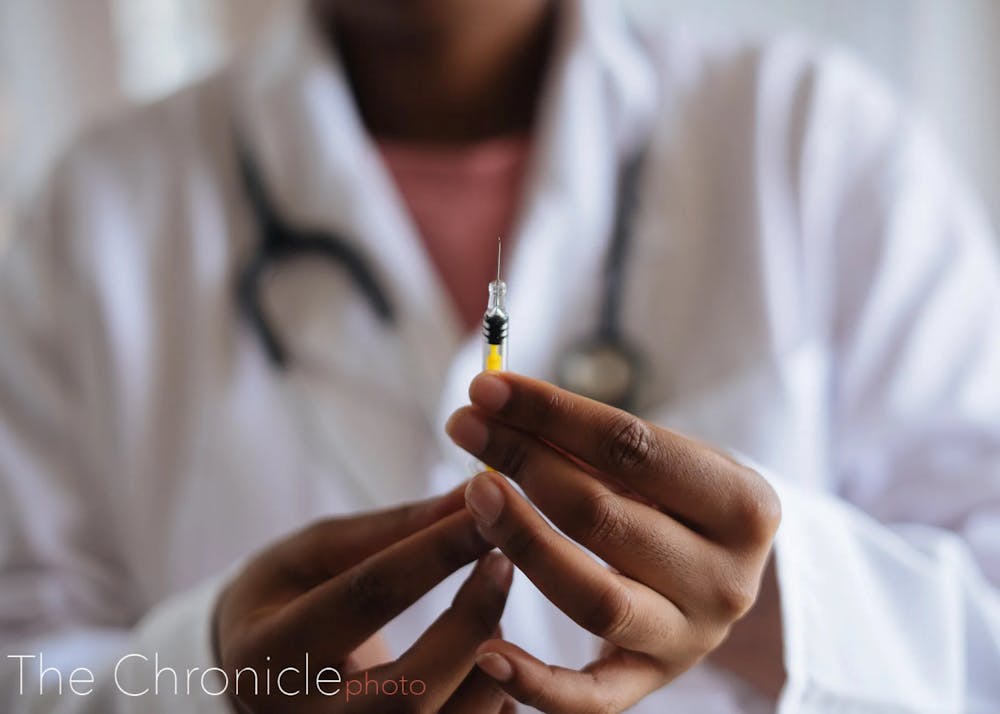A Duke study published in May led by Stephanie Langel, medical instructor in the department of surgery, found potential in a new oral COVID-19 vaccine. Langel’s work studied the vaccine with hamsters in conditions that mimicked human exposures, showing that the vaccine has the ability to boost mucosal immunity to protect individuals from infection and limit airborne transmission within a community.
The research team and the Bill and Melinda Gates Foundation, which provided funding support for the study, were interested in the potential of translating the pill-based vaccine platform to reach low-resourced areas.
“Compared with mRNA vaccines which often need cold-chain storage and require trained personnel at a physical site to administer the vaccine, the pill-based vaccine can be shipped in the mail and taken at home which makes it more accessible overall,” Langel said.
While mRNA vaccines administered intramuscularly have been valuable during the pandemic in reducing disease and death, mucosal vaccines, like this oral one, have the potential to boost immune responses against the emergence of new variants.
“From the pandemic, viral transmission has probably played the biggest role in how fast SARS-CoV-2 spreads and how it continues to spread. Moving forward, I think mucosal vaccines should be a part of the strategy as we continue to think about boosting immune responses if new variants emerge and that those strategies would hopefully not only protect the individual but also stop community spread as well,” Langel said.
The vaccine was originally developed by Vaxart, an American biotechnology company.
According to Langel, the pill-based vaccine can stimulate a gut immune response allowing antibody-secreting cells to migrate up to the upper respiratory tract. Antibodies differ in the blood and upper respiratory tract. One type, immunoglobulin G (IGG) is mostly found in the blood, while immunoglobulin A (IGA) is more abundant in the upper respiratory tract.
IGA, according to Langel, is more stable at the mucosal surface than IGG, so a vaccine that targeted mucosal surfaces, such as this oral vaccine, could produce a different, and potentially more effective, antibody production than already existing intramuscular COVID-19 vaccines.
Utilizing hamsters to test the efficacy of the virus, researchers administered a high dose of the virus to model breakthrough infections.
The hamsters were placed in a three chamber transmission box system. Vaccinated, SARS-CoV-2 infected hamsters were placed in the left chamber, while naive hamsters that were neither infected or vaccinated were placed in the opposite right chamber. A center chamber connected the two groups.
Without physical interaction between the two groups, Langel was interested in whether airborne transmission of the virus would occur.
The oral vaccine prompted the animals’ bodies to generate antibodies against the spike protein on the surface of SARS-CoV-2. These spike proteins are what allows the virus to bind to ACE2 receptors found in epithelial cells and infect them.
“If you can generate antibodies to block ACE2 receptor binding, then you can reduce infection.” Langel said.
The study’s findings suggested that oral and intranasal immunization reduced disease and transmission among the hamsters. However, Langel says she was surprised that transmission was not completely eliminated.
To see a higher reduction in transmission, she looks to future changes in experimental design.
“For example, we can explore how different dose levels of the virus influence the levels of transmission,” she said.
Langel’s research faces many challenges associated with the rapidly changing COVID-19 pandemic, including the emergence of new viral variants.
”The biggest challenge was that the virus mutated faster than we could do the experiments. We got the funding for this work in late 2020 and ran these experiments over the next six months,” Langel said. “So what we learned about mucosal vaccination is that you can reduce transmission but we can only talk about the original Wuhan, wild-type strain because that is what we used.”
Langel hopes to continue transmission experiments with the Omicron variant later this year or next.
Get The Chronicle straight to your inbox
Signup for our weekly newsletter. Cancel at any time.
Amy Guan is a Pratt senior and a senior editor of The Chronicle's 119th volume.

